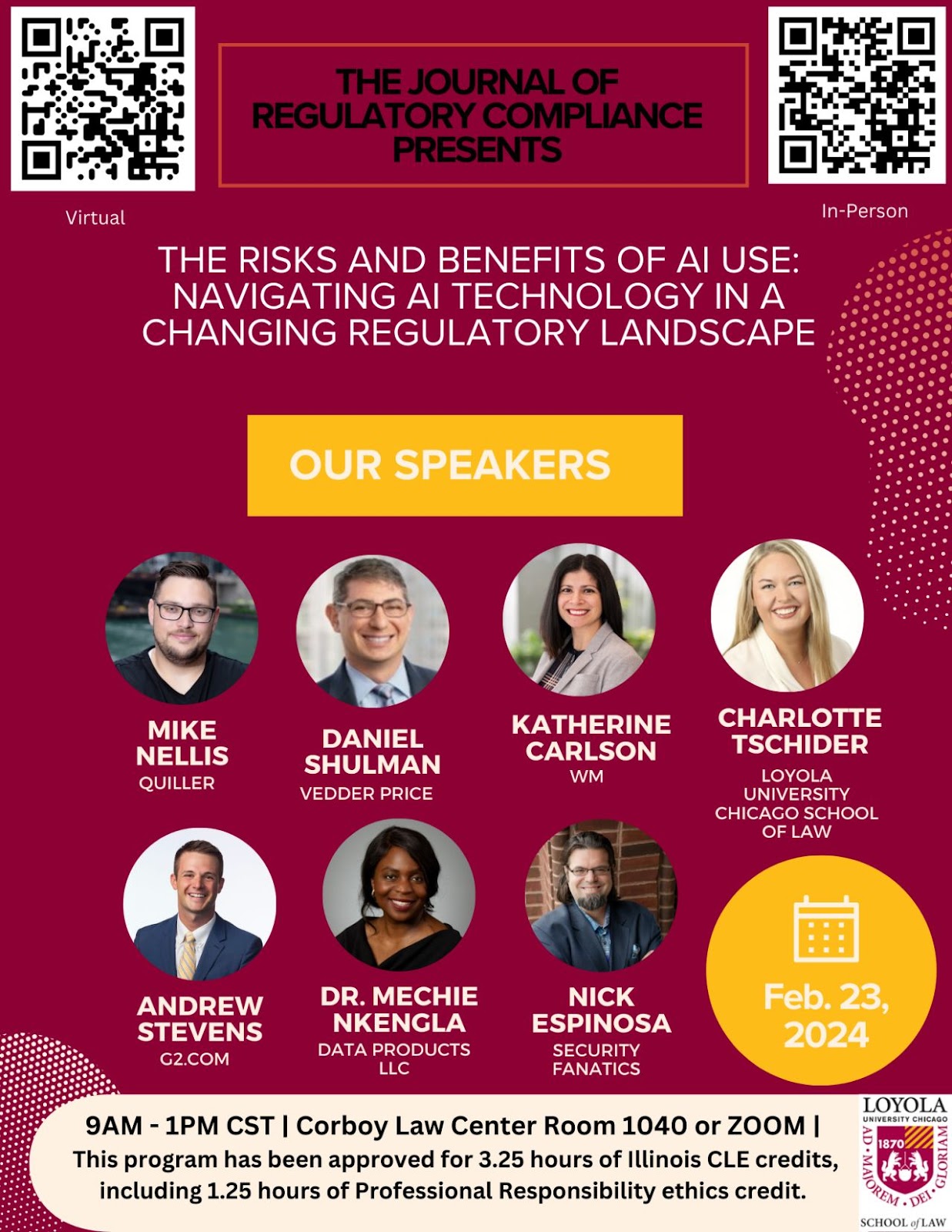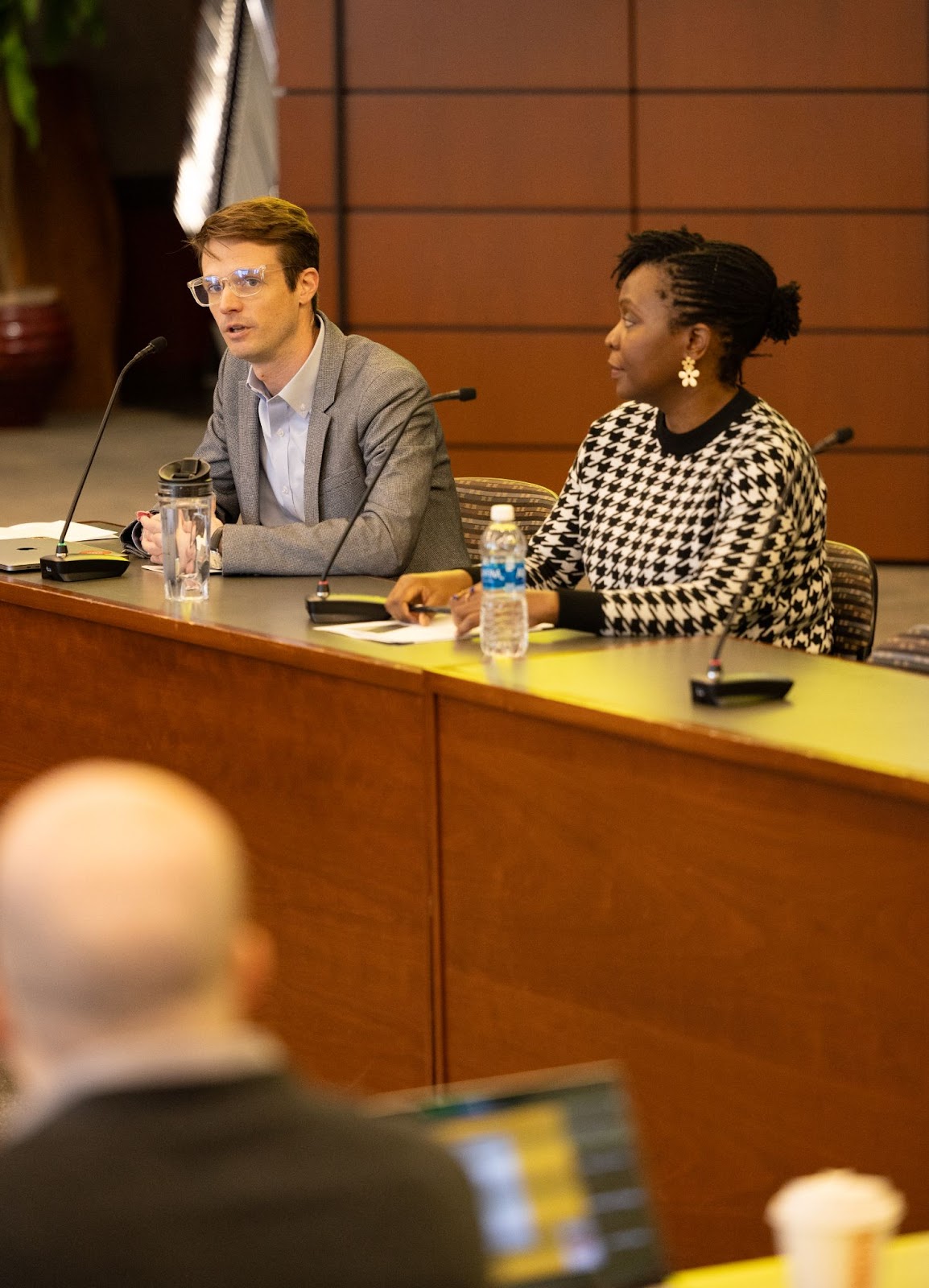After passing the bar in 2016, I transitioned from courtroom advocacy to Senior Corporate Counsel for G2, a Chicago unicorn, and the world's largest and most trusted software marketplace.
Positioned squarely at the intersection of 21st-century tech and 20th-century laws, the G2 legal team – led by General Counsel Eunice Buhler – has been cast as thought leaders in finding AI-driven solutions to strategize legal and commercial advantages.
At a recent symposium hosted at Loyola University Chicago School of Law, I spoke about AI technology in the legal landscape.
We’re obviously in the middle of an information revolution. In this revolution, the conversations on the legal risks of AI too often get stuck on concepts like “uncertain” and “developing,” with no insights to be drawn from these discussions.
But that’s a mistake. These changes surrounding AI present a golden opportunity for legal professionals to abandon the wholly useless “wait and see” status quo to become one of the few to start marching forward with their clients.

Source: Loyola University Chicago School of Law
Loyola’s symposium provided a great forum for exchanging perspectives and envisioning what the path looks like amidst the complexities of AI integration in legal frameworks. Drawing from our experiences at G2, where innovation forms a core component of our daily operations, I intended to challenge the prevailing narrative about AI law and promote a shift from uncertainty to strategic foresight.
The narrative around AI and law
At Loyola’s symposium, I talked about how the common narrative around AI law gets caught in a droning loop: uncertain and developing, developing and uncertain.
Yes, there’s some truth to these complex and constantly changing evolutions in AI, but it’s time to move past the hand-wringing and pearl-clutching. Dwelling solely on the challenges associated with AI holds back overall progress and innovation. We have to break free from this loop of the unknown and embrace a mindset of proactive adaptation.
Legal professionals must see AI as a world of opportunity. Agile corporate clients will use their legal departments to get ahead and not view them as a department to fear. It presents a chance to shape the legal terrain and sharpen a competitive edge in the process.
At G2, we’re not bystanders when continents shift; we’re the ones drawing new maps. Our approach isn't rooted in fear or hesitation, but in curiosity about the possibilities that AI offers. It’s a powerful tool that will revolutionize legal practices and redefine industry standards.
How global AI regulation is changing
Global AI regulation is undergoing a profound transformation, and at its heart lies the EU AI Act. This game-changer promises to redefine the way legal professionals approach AI governance.
The crux of my message at Loyola was that the EU AI Act clearly outlines the legal framework for US lawyers to transition from defense to offense. While many lawyers blame a lack of sufficient information on their inability to provide competent advice, the reality is that the EU AI Act has already articulated the guidance we need.
We must extend our gaze beyond our usual jurisdictions to embrace these standards; history shows that this level of adaptability is essential for vigorously representing corporate clients. Much like the GDPR became the gold standard for data privacy, the EU AI Act is poised to set the global benchmark for AI regulation.
This isn't just speculation. It’s the trajectory we're observing at G2 as we steer through the complexities of AI in the legal landscape.
Understanding the nuances of the EU AI Act travels beyond compliance into a strategic necessity. Its comprehensive approach underscores the shift toward a more regulated AI environment. Both law firms and in-house lawyers must drill deep into this legislation to learn its intricacies and prepare for its widespread impact.
Keep in mind that breaking the rules comes with a price. Ignoring or misunderstanding these regulations can result in substantial penalties, with fines ranging from €15 million or 3% of global annual turnover to as high as €35 million or 7% for severe infractions such as using AI to manipulate vulnerable groups or mishandling biometric data.

Andrew Stevens speaking at the Loyola University Chicago School of Law symposium.
The new world of AI: key insights
Here are some quick takeaways and actionable insights from my discussion at Loyola.
AI's influence
The first undeniable truth we must confront is that AI is a present-day reality that’s remapping the fabric of how we work, interact, and conduct business. Ignore AI and you'll find yourself in the same boat as BlackBerry, Blockbuster, and MySpace.
The EU AI Act affects business
The EU AI Act is becoming a guiding playbook for legal and business entities worldwide. Its comprehensive framework sets a new standard for AI regulation. Familiarize yourself with it because its influence will extend far beyond European borders.
Data quality and transparency are top priorities
Get ready to scrutinize your AI systems, particularly in high-risk areas, through the lenses of data quality, transparency, and accountability. Start cataloging your AI systems and their purposes now. Put pressure on your vendors to explain how they audit their data and models for bias. These proactive measures ensure ethical AI deployment and mitigate risks.
Learn from the mistakes of others
Study cases like Mobley v. Workday and EEOC v. iTutorGroup. They underscore the importance of developing and implementing fair, compliant AI systems with employment laws to prevent discrimination. By using these precedents, we shape AI strategies that align with legal mandates as we foster inclusivity and equality in the workplace.
Executives, you must lead by example!
Executives set the tone for organizational practices that prioritize transparency, fairness, and accountability in AI. Encourage your executive clients to adopt a top-down approach to AI strategy and vision so they can navigate the complexities of AI integration effectively and ethically. Leadership's close involvement serves as the key to driving meaningful change and creating a culture of honest AI practices and integrations.
Keep your eyes on California and Colorado
Looking ahead post-EU AI Act, there is a strong indication that California and Colorado will emerge as a frontrunners in crafting AI legislation. Like the CCPA and CRPA followed GDPR, California and Colorado are set up to lead the United States in navigating the new landscape of AI regulation by building upon the foundational principles established by the EU AI Act.
AI and the road ahead
The discussions and insights shared during Loyola’s symposium demonstrated how AI will shape the future of the legal industry. As technologies evolve and regulatory frameworks adapt, organizations must remain agile and informed to take advantage of the full potential of AI, even as they mitigate risks and challenges.
At G2, we refuse to let uncertainty hinder our progress. We view these challenges as opportunities to innovate and lead the way toward a more informed legal future. Our approach to AI regulation is not one of mere compliance but of leadership and vision, so our actions set the bar for what it means to implement AI responsibly.
Want more guidance about effectively integrating generative AI into your business processes? Here are seven tips from G2’s own General Counsel, Eunice Buhler.
 by Eunice Buhler
by Eunice Buhler
 by Troy Wheeler
by Troy Wheeler
 by Eunice Buhler
by Eunice Buhler